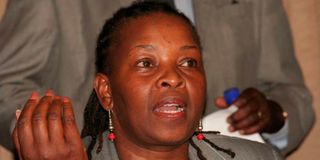2022 election: Prepare the ground early, women urged

Greenpeace Africa Executive Director Njeri Kabeberi says women leaders should create an image long before they vie for elective positions to enable their visibility.
What you need to know:
- Studies have shown that women take time to dive into elective politics, whereas men take an active lead in seeking for votes.
- Prof Margaret Kobia has urged women to gradually build a leadership portfolio with the electorate such that the community can easily vouch for them when election time comes.
Women seeking to successfully vie for elective seats have been urged to prepare the ground early.
Studies have shown that women take time to dive into elective politics, whereas men take an active lead in seeking for votes.
A 2008 study Why Are Women Still Not Running for Public Office? published on Brookings found that women were less likely than men to consider running for office and less likely than men to take any of the steps required to mount a political campaign.
Gender equality advocates are now calling on women to start early in preparing the voters for their candidacy.
“Women leaders need to create an image long before they vie for elective positions to enable their visibility,” said Greenpeace Africa Executive Director Njeri Kabeberi during a quarterly multi-sectoral stakeholder forum on Women Leadership in Kenya on Tuesday.
“They also need to create a concrete agenda that resonates with the electorate,” she added in the virtual meeting jointly convened by Echo Network Africa, Democracy Trust Fund and Hanns Seidel Foundation-Kenya.
Ministry of Public Service and Gender, Cabinet Secretary, Prof Margaret Kobia has made a similar appeal.
Elective seats
In an earlier interview with nation.africa, she urged women to gradually build a leadership portfolio with the electorate such that the community can easily identify and vouch for them when the time comes for them to seek an elective seat.
She is, however, concerned that women continue to repeatedly face multiple challenges, keeping them from competing for elective seats.
The violence, lack of funding, negative cultural norms, stereotypes and prejudices are all compounded obstacles that have perpetually frustrated women’s rise to political leadership, she observed.
“We need to ask ourselves, ‘how do we deal with these barriers?’” she queried during an Annual Women Rights Organisation Convention 2021 bringing together feminists across Kenya.
“Having an elective position matters because this is where decisions are made …decisions regarding budget …imagine having a woman in Parliament who understands why we need more budget for water,” she said.
There is, however, hope for an increased representation of women to Parliament.
Independent Electoral and Boundaries Commission, Chairperson Wafula Chebukati said on Monday the commission will reject any nomination list from a political party, that does not comply with the two-thirds gender rule in fronting candidates for Member of Parliament and Senate seats, a move that would be in compliance with the 2017 High Court ruling.





